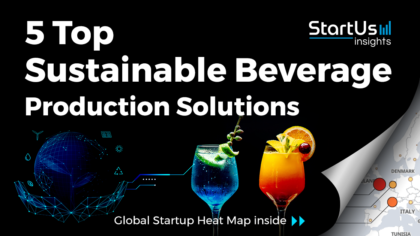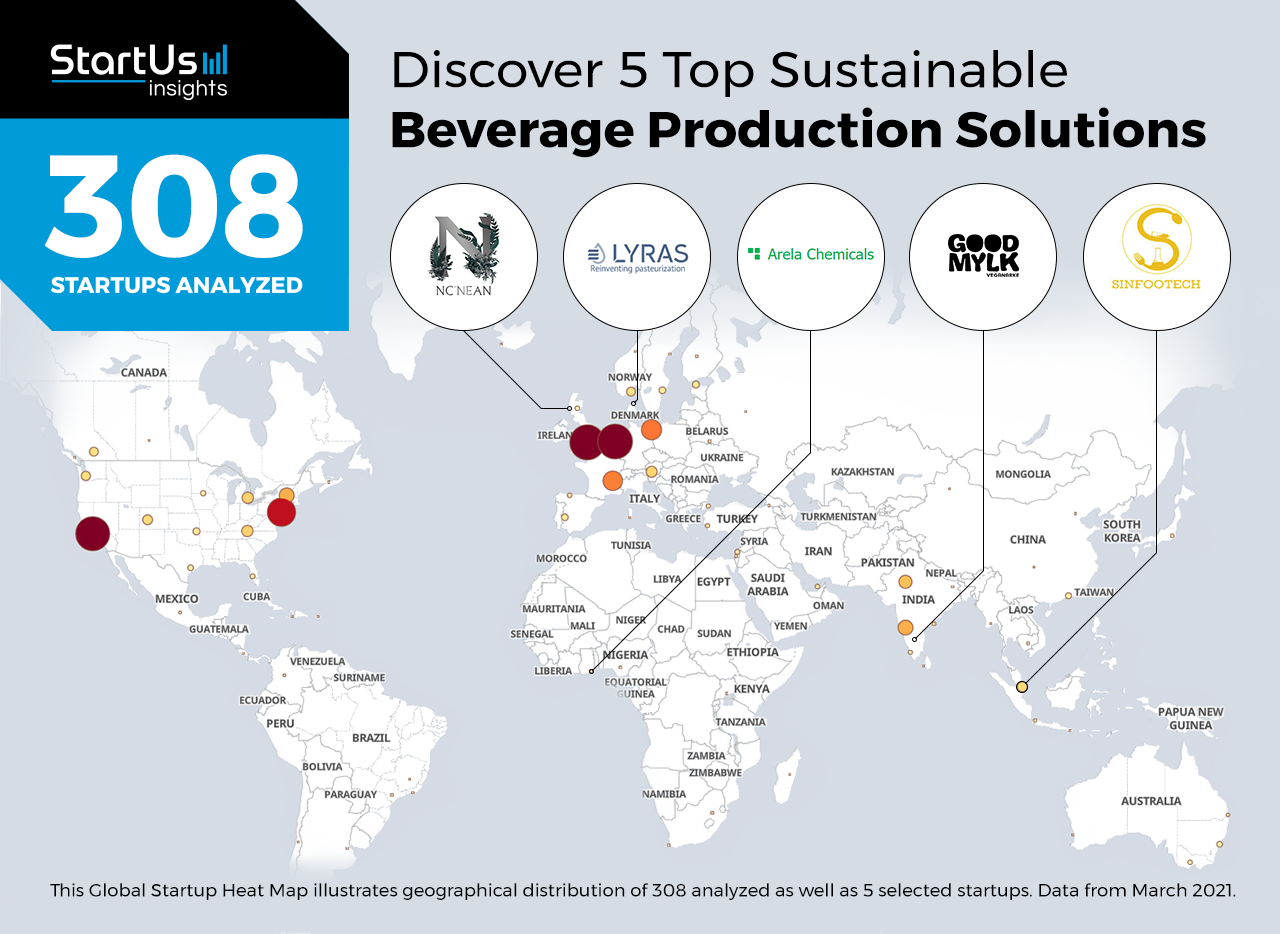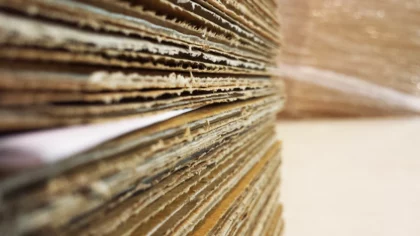Staying ahead of the technology curve means strengthening your competitive advantage. That is why we give you data-driven innovation insights into the food industry. This time, you get to discover 5 hand-picked sustainable beverage production solutions.
Global Startup Heat Map highlights 5 Top Sustainable Beverage Production Solutions out of 308
The insights of this data-driven analysis are derived from the Big Data & Artificial Intelligence-powered StartUs Insights Discovery Platform, covering 1.379.000+ startups & scaleups globally. The platform gives you an exhaustive overview of emerging technologies & relevant startups within a specific field in just a few clicks.
The Global Startup Heat Map below reveals the distribution of the 308 exemplary startups & scaleups we analyzed for this research. Further, it highlights 5 startups that we hand-picked based on criteria such as founding year, location, funding raised, and more. You get to explore the solutions of these 5 startups & scaleups in this report. For insights on the other 303 sustainable beverage production solutions, get in touch.
Lyras develops Cold Pasteurization Technology
Pasteurization is a standard method to sterilize beverages during processing. However, it requires large amounts of energy to heat beverages to pasteurize them, making the process unsustainable. This is why startups are looking for non-thermal pasteurization techniques. For example, food processing startups use cold pasteurization to disinfect beverages with radiation.
Danish startup Lyras develops cold pasteurization technology to minimize water and energy use in the process. The startup’s technology uses low-pressure germicidal lamps that produce disinfecting UV light. This reduces the need for water in the production of dairy as well as juices, soft drinks, and other beverages. The process also saves energy and lowers the carbon footprint by eliminating the need for energy-intensive heating.
Nc’nean Distillery advances Sustainable Distilling
Alcohol production has a massive carbon footprint, with a large portion of it coming from distilleries. The distillation process also uses up large amounts of water and, moreover, the wastewater generated is too acidic for use in irrigation. That is why food & beverage (F&B) startups are developing new solutions to make distillation more sustainable. In addition to lowering water use, such solutions repurpose spent distillation ingredients.
British startup Nc’nean Distillery uses sustainable distilling practices in the production of its spirits. It makes whisky spirit from 100% organic Scottish barley grown with practices that boost biodiversity and soil health. The startup powers its copper pot stills with a biomass boiler that uses wood sourced responsibly from a local forest. Lastly, it uses green and renewable energy in the entire production process.
Goodmylk makes Plant-based Milk
The dairy industry contributes to massive greenhouse emissions. To address this, startups and companies are creating alternative dairy solutions. For instance, cultures globally have long consumed different kinds of plant milk. With developments in FoodTech, startups now offer plant-based milk with a similar nutritional and taste profile as dairy milk.
Indian startup Goodmylk produces plant-based alternatives to dairy. The startup uses locally procured raw materials and processes them locally to minimize environmental impact. It uses peanuts and cashews to produce plant-based milk, replacing animal agriculture, and carefully converted microbial strain to produce yogurt. Further, the company uses recyclable materials for packaging and offers flexible packaging, wherever possible.
Arela Chemicals turns Waste-to-Value
Utilizing agricultural waste as raw ingredients presents a way for beverage companies to make their production sustainable. It reduces the environmental impact by diverting waste from landfills as well as reducing the need for land to grow the crops for ingredients. This is why FoodTech startups are turning to waste valorization solutions. Such solutions produce high-value chemicals while also enabling a circular economy.
Arela Chemicals is a Ghanaian startup producing high-purity chemicals. The startup uses biogas generated from corn stover to power its production process. It manufactures high-purity chemicals for use in the food & beverage industries where it offers liquefied carbon dioxide (CO2) for sustainable beverage production.
SinFooTech produces Soy Alcoholic Beverage
Food processing units generate large amounts of waste that are generally not usable further. To incorporate these back into food production, startups are leveraging a range of bioconversion technologies. By adding value to food waste, these solutions open up another revenue stream for F&B companies. For instance, startups are brewing new alcoholic beverages from a variety of food waste.
Singaporean startup SinFooTech produces a soy-based alcoholic beverage. The startup’s patented fermentation technology converts soy whey, a byproduct from tofu production, into Sachi, an alcoholic drink. Sachi has a sake-like flavor profile, is gluten-free, and rich in antioxidants. SinFooTech is presently scaling up its fermentation process as well as developing new variants of Sachi.
Discover more Food Startups
Food startups such as the examples highlighted in this report focus on low-sugar foods & beverages, plant-based alternatives as well as artificial proteins. While all of these technologies play a major role in advancing the food industry, they only represent the tip of the iceberg. To explore more food technologies, simply get in touch to let us look into your areas of interest. For a more general overview, you can download our free Food Innovation Report to save your time and improve strategic decision-making.









